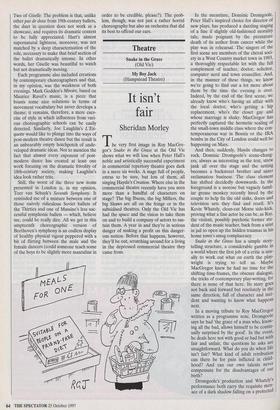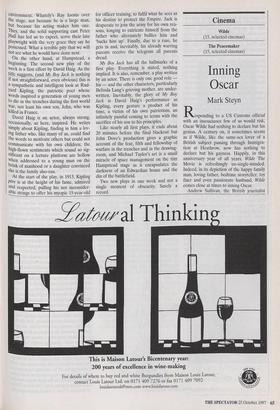Theatre
Snake in the Grass (Old Vic) My Boy Jack (Hampstead Theatre)
It isn't fair
Sheridan Morley
The very first image in Roy MacGre- gor's Snake in the Grass at the Old Vic shows what we will lose when Peter Hall's noble and artistically successful experiment in commercial repertory theatre goes dark in a mere six weeks. A stage full of people, extras to be sure, but lots of them, all singing Haydn's Creation. Where else in the commercial theatre recently have you seen more than a handful of characters on stage? The big Ibsens, the big Millers, the big Shaws are all on the fringe or in the subsidised theatres. Only the Old Vic has had the space and the vision to take them on and to build a company of actors to sus- tain them. A year in and they're in serious danger of making a profit on this danger- ous notion. Before that happens, however, they'll be out, scratching around for a living in the depressed commercial theatre they came from. In the meantime, Dominic Dromgoole, Peter Hall's inspired choice for director of new plays, has produced a dazzling staging of a fine if slightly old-fashioned morality tale, made poignant by the premature death of its author from cancer while the play was in rehearsal. The singers of the first scene are members of the choral soci- ety in a West Country market town in 1993, a thoroughly respectable lot with the full complement of teacher, doctor, solicitor, computer nerd and town councilor. And, in the manner of these things, we know we're going to find out a lot more about them by the time the evening is over. Indeed, by the end of the first scene, we already know who's having an affair with the local doctor, who's getting a hip replacement, who's the closet gay and whose marriage is shaky. MacGregor has perfectly captured the hermetic sealing of the small-town middle class where the con- temporaneous war in Bosnia or the IRA bombs in the City of London could well be happening on Mars.
And then, suddenly, Haydn changes to rock, Dominic Dromgoole's scene-chang- ers, always as interesting as the text, strew junk all over the stage and the setting becomes a backstreet brother and sister reclamation business. The class element has shifted decidedly downwards. In the foreground is a morose but vaguely famil- iar grease monkey recently hired by the couple to help fix the old sinks, doors and television sets they find and resell. It's Kevin Whately, clean-cut Morse side-kick, proving what a fine actor he can be, as Ray, the violent, possibly psychotic former stu- dent of the music teacher, back from a stint in jail to open up the hidden traumas in his home town's smug complacency.
Snake in the Grass has a simple story- telling structure, a considerable gamble in a world where the first job of a critic is usu- ally to work out what on earth the play- wright is trying to tell us. Maybe MacGregor knew he had no time for the shifting time-frames, the obscure dialogue, the tricks of contemporary play-writing, for there is none of that here. Its story goes not back and forward but resolutely in the same direction, full of character and inci- dent and wanting to know what happens next.
In a moving tribute to Roy MacGregor written as a programme note, Dromgoole says he had 'the grace of a man who, know- ing all the bad, allows himself to be contin- ually surprised by the good'. In the event, he deals here not with good or bad but with fair and unfair, the questions he asks are straightforward. What do you do when life isn't fair? What kind of adult retribution can there be for pain inflicted in child- hood? And can our own talents never compensate for the disadvantages of our birth?
Dromgoole's production and Whately's performance both carry the requisite men- ace of a dark shadow falling on a protected environment. Whately's Ray looms over the stage, not because he is a large man, but because his acting makes him one. They, and the solid supporting cast Peter Hall has led us to expect, serve their late playwright with the very grace they say he possessed. What a terrible pity that we will not see what he would have done next.
On the other hand, at Hampstead, a beginning. The second new play of the week is a first effort by David Haig. As the title suggests, (and My Boy Jack is nothing if not straightforward, even obvious) this is a sympathetic and intelligent look at Rud- yard Kipling, the patriotic poet whose words inspired a generation of young men to die in the trenches during the first world war, not least his own son, John, who was killed in France.
David Haig is an actor, always strong, occasionally, as here, inspired. He writes Simply about Kipling, finding in him a lov- ing father who, like many of us, could find the words to motivate others but could not communicate with his own children; the high-flown sentiments which sound so sig- nificant on a lecture platform are hollow when addressed to a young man on the brink of manhood or a daughter convinced she is the family also-ran. s At the start of the play, in 1913, Kipling Pere is at the height of his fame, admired and respected, pulling his not inconsider- able strings to offer his myopic 15-year-old for officer training, to fulfil what he sees as his destiny to protect the Empire. Jack is desperate to join the army for his own rea- sons, longing to extricate himself from the father who alternately bullies him and `bucks him up'. Finally, due to a ruse, he gets in and, inevitably, his already warring parents receive the telegram all parents dread.
My Boy Jack has all the hallmarks of a first play. Everything is stated, nothing implied. It is also, remember, a play written by an actor. There is only one good role his — and the other characters, particularly Belinda Lang's grieving mother, are under- written. Inevitably, the glory of My Boy Jack is David Haig's performance as Kipling, every gesture a product of his time, a victim of his own patriotism, an infinitely painful coming to terms with the sacrifice of his son to his principles.
Like nearly all first plays, it ends about 20 minutes before the final blackout but John Dove's production gives a graphic account of the fear, filth and fellowship of warfare in the trenches and in the drawing- room, and Michael Taylor's set is a small miracle of space management on the tiny Hampstead stage as it encapsulates the darkness of an Edwardian house and the din of the battlefield.
Two new plays in one week and not a single moment of obscurity. Surely a record.



















































































 Previous page
Previous page